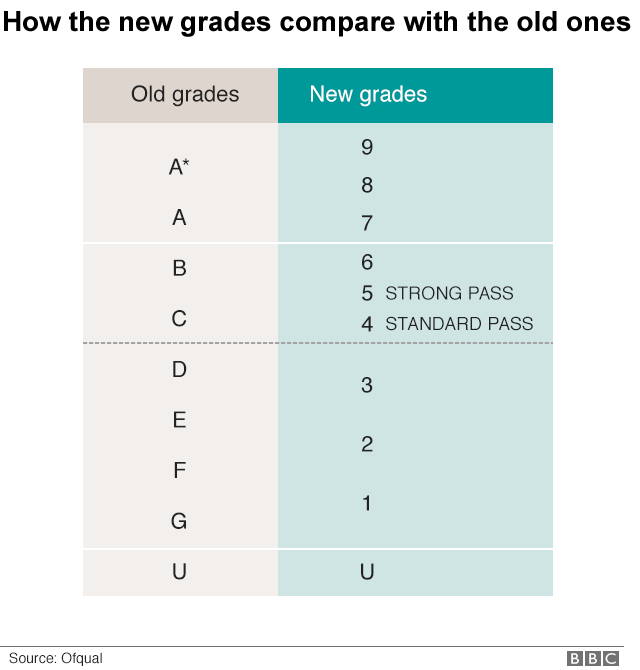GCSEs: How do the new 9-1 grades work?
- Published
- comments

Thousands of teenagers across England, Wales and Northern Ireland are receiving their GCSE results. But, in England, there have been major changes, with a new 9-1 grading system being phased in to reflect a more demanding curriculum. So what's the new grading system all about?
What are the new grades?
The new grading scheme is being brought in alongside a new GCSE curriculum in England.
9 is the highest grade, while 1 is the lowest, not including a U (ungraded).
Three number grades, 9, 8 and 7, correspond to the old-style top grades of A* and A - this is designed to give more differentiation at the top end.
The exams watchdog, Ofqual, says fewer grade 9s will be awarded than A*s and that anyone who gets a 9 will have "performed exceptionally".
A 4 is broadly being compared to a C grade, although Ofqual warns against "direct comparisons and overly simplistic descriptions".
It says that, broadly, the same proportion of teenagers will get a grade four and above as used to get a grade C or above.
Strong pass and standard pass - what's all that about?
It's confusing, but there are two pass marks - 4 is a standard pass and 5 is a strong pass.
This means that a candidate who gets nine 4 grades has, technically, passed all their exams.
However, with the government's school league tables, external detailing what percentage of pupils achieved a grade 5 or above in English and maths and in the English Baccelaureate, external subjects, it's hard to imagine that teachers will be content to see their pupils settle for a 4 as a pass.
The reality is that schools will be pushing pupils for at least a 5 and most sixth forms will be looking for students with strong passes.
Are new 9-1 GCSEs being phased in?
Yes they are. Last summer, students sat the new exams in just English language, English literature and maths.
This year's Year 11 students sat the 9-1 exams in:
ancient languages (classical Greek, Latin)
art and design
biology
chemistry
citizenship studies
combined science (double award)
computer science
dance
drama
food preparation and nutrition
geography
history
modern foreign languages (French, German, Spanish)
music
physics
physical education
religious studies
Next summer, 2019, will see a third wave of 9-1 exams in:
ancient history
astronomy
business
classical civilisation
design and technology
economics
electronics
engineering
film studies
geology
media studies
modern foreign languages (Arabic, Bengali, Chinese, Italian, Japanese, modern Greek, modern Hebrew, Panjabi, Polish, Russian, Urdu)
psychology
sociology
statistics
The final wave of 9-1 GCSEs will be taught from this autumn, with exams in 2020, covering:
ancient languages (biblical Hebrew)
modern foreign languages (Gujarati, Persian, Portuguese, Turkish)
So some teenagers will have a mix of GCSEs under different marking schemes?
Yes, that's right.
Last year's Year 11s got their English and maths results under the new numerical grading scheme, and the rest of their options were graded A*-G.
This year's cohort are sitting most of their GCSEs under the new system, but they will get some results under the old system, for example if they are taking ancient history or ICT.
Are there any other changes?
Yes, there are changes to the way in which grades for combined science are being allocated.
This qualification is worth two grades. Under the old system, candidates would be given a combined score that was effectively a single grade doubled up - so A*/A*, A/A, B/B and so on.
The new system allows for a little more differentiation, so that students will be given two equal grades (for example 5/5) or adjacent grades (for example 5/4).
In total, there are 17 possible grade combinations from 9/9 to 1/1.
Why have the grades been changed?
The new GCSE grading scheme is part of a new curriculum introduced in England's schools in 2014 by the then Education Secretary, Michael Gove.
The new GCSE courses include much less coursework than before, with grades in almost all subjects depending on exams.
Courses are designed to be more challenging with exams taken after two years of study, rather than in modules with exams along the way.
What's happening in Wales?
Change has been under way in Wales as well. The Welsh government introduced new and revised GCSEs, which have been taught in schools from September 2015.
The most significant changes are in English language, Welsh language and mathematics.
But, one crucial difference to England is that the letter-based grading structure A*- G is being maintained.
What's happening in Northern Ireland?
While pupils in England will have results graded 9-1 and pupils in Wales will have A*-G graded results, pupils in Northern Ireland will end up with a mix of A*-G and numerical grades.
Approximately three-quarters of GCSEs in Northern Ireland are taken through the NI Council for Curriculum, Examinations and Assessment (CCEA) and the remaining quarter through the English- and Welsh-based exam boards AQA, OCR, Edexcel or WJEC.
And what about Scotland?
Scotland has its own system of public examinations: Nationals and Highers.
Nationals replaced the old Standard Grades in 2014. And new Higher exams were introduced in 2015.
Reporting by BBC News education reporter Katherine Sellgren